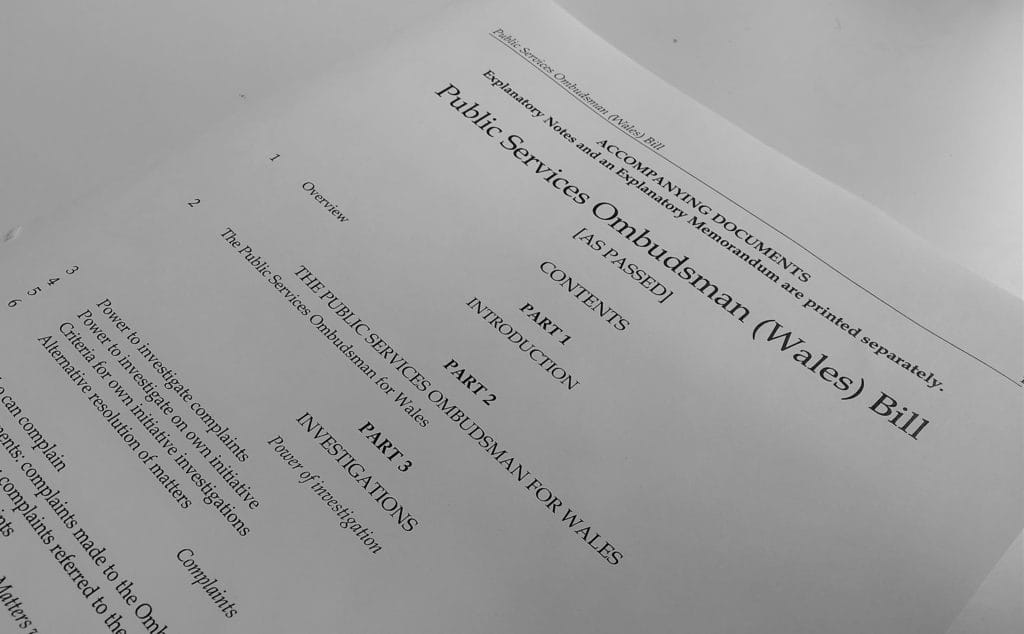Last week, the National Assembly for Wales passed the Public Services Ombudsman (Wales) Bill, which will extend the powers held by the office of the Public Services Ombudsman for Wales. The Bill will replace the existing Public Services Ombudsman (Wales) Act 2005, which established the role of the Ombudsman. Newsdirect health specialist Madelaine Phillips takes a closer look at the Bill.
What does the Ombudsman do?
The Ombudsman has legal powers to investigate complaints about ‘listed authorities’ which include the Welsh Government, councils, local health boards and the education inspectorate Estyn. The position is independent from government and is appointed by the Queen on the recommendation of the National Assembly. The current Ombudsman is Nick Bennett, who was appointed in August 2014 for a seven-year period.
Reforms
This isn’t the first time the Ombudsman’s powers have been extended; the Social Services and Well-being (Wales) Act 2014 allowed the office to cover complaints relating to social care and palliative care in the private sector. A significant proportion of the new Bill restates the existing 2005 Act, but some sections have been modified substantially and the legislation creates four key new provisions:
Own-initiative investigations
The own-initiative provision allows the Ombudsman to undertake investigations without a complaint being referred. As the Bill passed through the Assembly concerns were raised that this new power could lead to duplication of work and a messy regulatory landscape. During the scrutiny process, the Bill was amended to specify criteria the Ombudsman must meet before embarking on an own-initiative investigation, and there is also a duty on the Ombudsman to consult with listed authorities.
Oral complaints
When it comes into force, the Bill will alter Section 5(1) of the 2005 Act, which states that all complaints to the Ombudsman must be made in writing. While the Act did give the Ombudsman a discretionary power to accepts other forms of complaints, this was judged as insufficient to properly allow access for vulnerable people. Under the new provision, complainants will be allowed to make complaints orally, though concerns were raised about the ability to properly verify an oral complaint. It has been argued that this change will future proof the Ombudsman’s office and allow the development of guidance to respond to the changing nature of electronic communications and advances in technology.
Matters which may be investigated
This provision refers to the Ombudsman’s ability to investigate the private healthcare element of treatment received or commissioned by an individual. Previously, the Ombudsman could only investigate private services if they were directly commissioned by NHS Wales. The Ombudsman had argued that this approach was not patient-led, though the new provision only allows the Ombudsman to investigate private healthcare if it forms part of a public/private pathway.
Complaints handing
The Bill provides the Ombudsman with the power to publish a statement of principles on complaints-handing procedures and model complaints-handling procedures for listed authorities. When first proposed, this power was a point of contention within the health sector as there is already non-statutory guidance in the form of ‘Putting Things Right’, which is derived from the National Health Service (Concerns, Complaints and Redress Arrangements) (Wales) Regulations 2011. However, it was argued that this new provision could provide a statutory basis for guidance given by the Ombudsman and support improvements in complaints handling in the public sector.
Going forward
The Bill is currently in the Post Stage 4 stage, after which it will go forward to Royal Assent and become an Act of the Assembly. Llyr Gruffydd, the chair of the Finance Committee which introduced the Bill, said he believes strengthening the Ombudsman’s role will improve social justice and protect the most vulnerable in society.
Newsdirect is a political monitoring company with offices in Cardiff, Edinburgh and London. We provide a range of services to clients with a wide range of interests in Welsh public affairs. Why not try out our new service, Senedd Today, or subscribe to our free daily political briefing from Wales.



